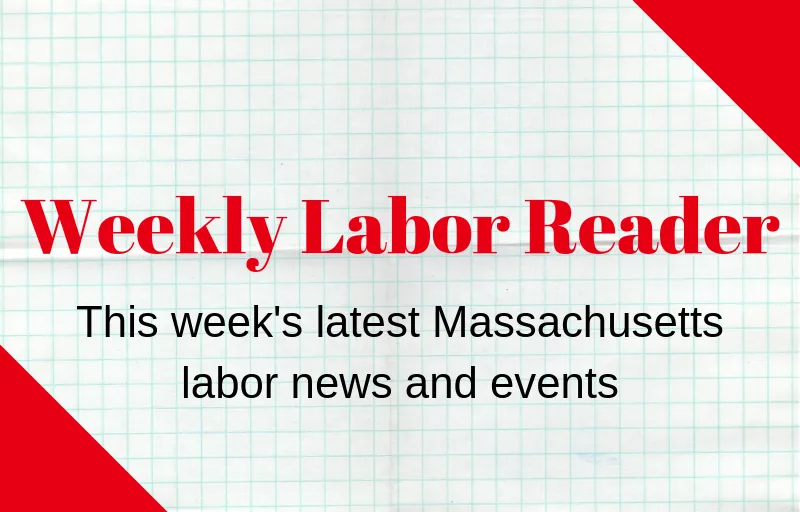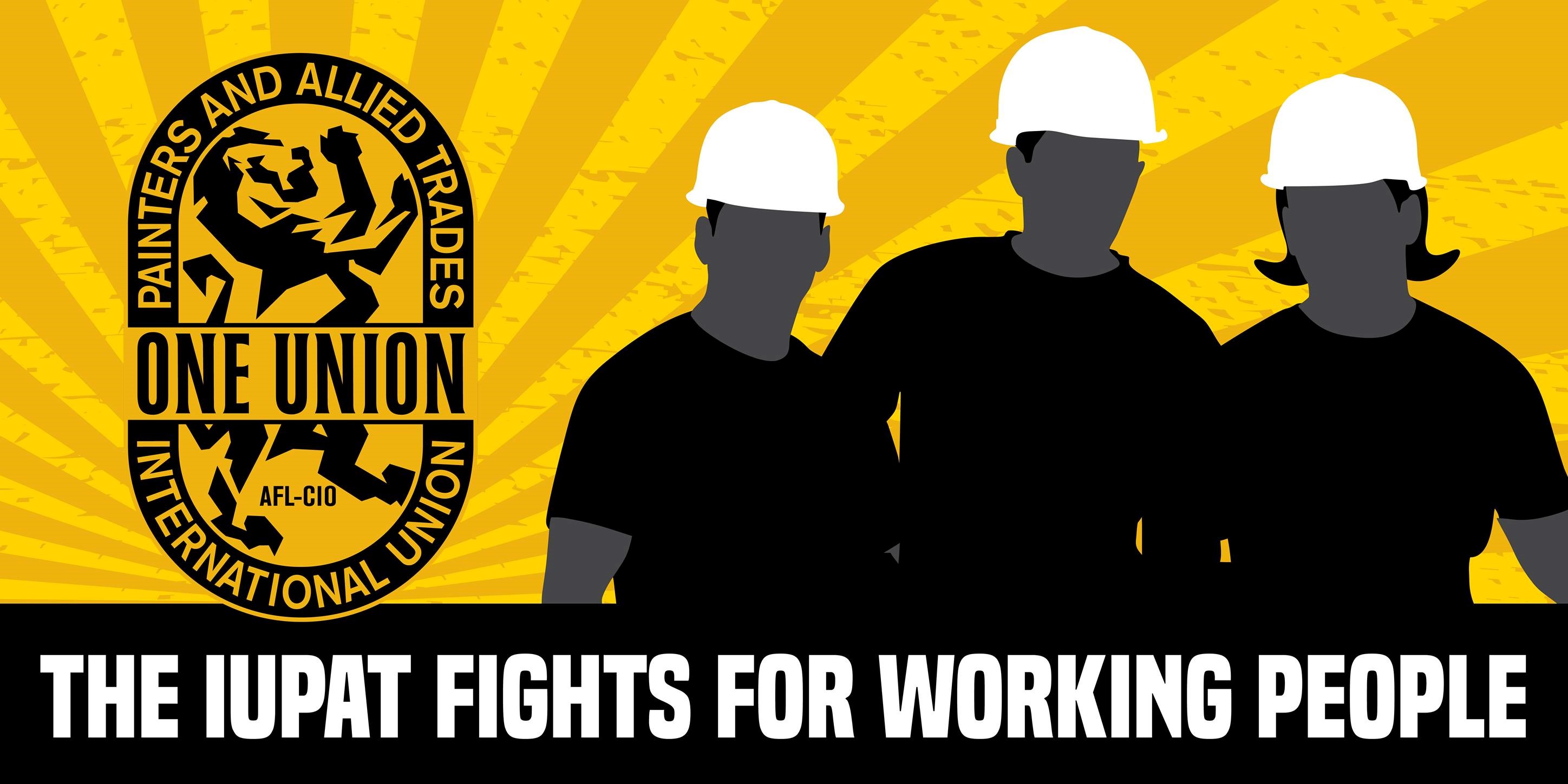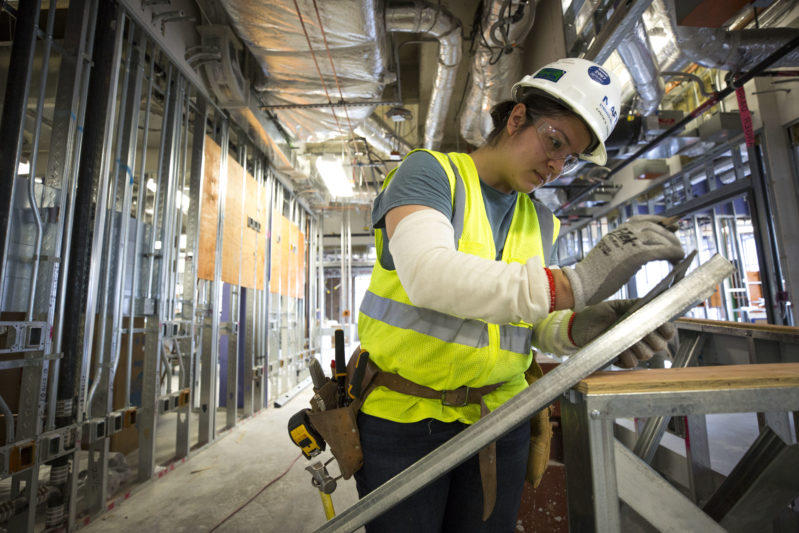Weekly Labor Reader, June 19, 2019

To receive these updates in your inbox, sign up here!
.png) SEIU 1199 PCAs Settle Contract
SEIU 1199 PCAs Settle Contract
SEIU 1199 reached a tentative contract agreement with the state of Massachusetts, which will lift wages and enhance benefits for nearly 50,000 personal care attendants who work with Medicaid beneficiaries. The contract includes includes wage increases, improved paid time off, education and funding opportunities and language to protect PCAs against non-payment for hours worked.
The members will vote to ratify the contract later this summer. This contract victory comes after the Trump administration’s attempts to target PCA union workers. Congratulations to the worker-members of SEIU 1199 who have proven that in the face of adversity, we can fight back and make gains. Go, fight, win!
Thursday: AFSCME Rally to Fight Privatization in Saugus
Contracts for the Saugus school district’s 20 custodians are set to expire on June 30 and hundreds of residents are petitioning for the School Committee to reject the idea of privatizing their jobs. While the custodians' contract remains in jeopardy, members of the School Committee have shrouded their deliberation process in secrecy and attempted to shield their votes on privatization from the public. Read more from Wicked Local here.And read a resident's perspective on why they support public school custodians from ItemLive here.
Building Trades Perspective: Springfield Development Must Benefit Families
From Frank Callahan, President of the MA Building Trades Council & Dan D'Alma, Business Manager of IBEW 7
By many accounts, Springfield is in the midst of a resurgence. After being on the brink of bankruptcy 15 years ago, today the city is on sound financial footing, having eradicated a $41 million deficit. What’s more, new industries are locating here and public and private infrastructure projects are coming in to the tune of $3 billion. You’d think all of that investment would add up to a strong economy and a secure workforce. But despite the city’s improved economic outlook, the picture isn’t quite so rosy for many of the families that call Springfield home. A quarter of the city’s residents live in poverty. The unemployment rate is higher here than in other parts of the state. And for too many residents, good jobs with family-sustaining wages remain stubbornly out of reach.
The question on many folks’ minds is how can Springfield ensure that the benefits of the city's revitalization are shared by all, and not just a select few?
In a word: unions. Think about it: Workers with union wages and benefits earn enough money to support their families, invest in their homes and neighborhoods, spend money in their local communities, and provide opportunities for their children. Unions are the foundation of a strong middle-class.
In the Massachusetts Building Trades Unions, we know that you can't have a thriving economy without thriving families. That's why we offer industry-leading wages and benefits to more than 75,000 people. By ensuring that the largest workforce in the state earns a middle-class livelihood, we’re able to create strong families and communities that drive our economy forward.
While others in the private sector are slashing benefits and leaving families with insurmountable medical bills, the building trade unions are doubling down on our commitment to working families. We spent more than $1 billion last year keeping families healthy, and we're proud that more than 260,000 children, spouses, and construction workers across the Commonwealth count on us for great healthcare coverage.
We know that we can’t just provide the best wages and benefits though. To compete, our members have to be the best, most highly-skilled tradespeople in the nation. That’s why we invest over $55 million in training each year at more than 40 state-of-the-art training facilities.
Springfield has seen the benefits of unions firsthand. Many of the city's biggest projects have relied on union labor to get the job done right and ahead of schedule, including the I-91 Viaduct Rehabilitation Project, CCRC railroad, and the MGM Casino. That's good news for commuters, local businesses, taxpayers, and hundreds of skilled local tradesmen and women who are able to pay their bills, support their families, and put money back into the local economy.
All of this investment adds up. Across the Commonwealth, the building trades unions have generated more than $44 million in new tax revenue. Our total economic impact for the state is $1.6 billion, and we want to bring an ever bigger share of that activity to Springfield.
With Springfield's revitalization comes many opportunities. Let's make sure that the hardworking men and women who are building the city's future are also able to build their own, through great careers with union benefits, wages, and training.
See how your legislators voted on the Fair Share Amendment
What Happened: On Wednesday, June 12th by a final vote of 147 - 48, our elected officials in the MA Legislature passed the Fair Share Amendment! This 75% favorable margin is the HIGHEST we've ever achieved for Fair Share. Click here to see how your legislators voted.
What's Next: This vote was the first of three constitutional hurdles for Fair Share to soar passed. Now, Fair Share is positioned to be voted on in the next legislative cycle where we'll need more than 50% of the vote in order for our constitutional amendment to land on the 2022 ballot for ratification by all of us - the voters of Massachusetts.
What Can You Do: Send an email, make a phone call, and Tweet at your legislator thanking them for their courageous vote!
Read President Tolman's Testimony to Labor & Workforce Development Committee
On Tuesday June 18th, the Massachusetts Legislature’s Joint Committee on Labor and Workforce Development heard several bills related to wages, overtime and tips. The Massachusetts AFL-CIO was proud to register its position on many of these bills, which include support for a bill to update overtime protections for salaried workers who currently exceed the extremely low threshold of $23,660 set by the federal Fair Labor Standards Act, support for bills to strengthen the prevailing wage, and a bill restoring Sunday time-and-one-half wages for retail workers. Click here to read more about the bills and the Massachusetts AFL-CIO’s testimony.
Education Coalition Sues MA Over Inequality
Parents and students from seven communities will join advocacy groups to sue the state over disparities in public education, alleging that chronic underfunding provided to their districts unfairly leaves wide swaths of students behind compared to their peers.
The plaintiffs include students and parents from Chelsea, Chicopee, Fall River, Haverhill, Lowell, Orange and Springfield -- all diverse municipalities with above-average proportions of low-income families -- as well as the NAACP's New England Area Conference and the Chelsea Collaborative, according to a Thursday morning press release from the Council for Fair School Finance, a non-profit that includes major teachers unions.
A copy of the lawsuit was not immediately available, but the press release indicated plaintiffs plan to file it Thursday and allege "constitutional violations of students' education and civil rights as a result of the state's inadequate school funding system."
Parents involved will join advocates at a press conference Thursday afternoon, scheduled for 1 p.m. in Room 428 of the State House, to discuss the case. The Council for Fair School Finance helped develop the lawsuit.
Last month, municipal officials from Brockton, New Bedford and Worcester threatened a similar lawsuit over the state's foundation budget formula used to calculate education funding. A commission tasked with reviewing the formula in 2015 concluded that it underfunds public education by at least $1 billion a year, failing to adequately account for costs of employee health care, special education, and the additional needs of low-income students and English language learners.
Read more on the lawsuit here and here.
There are currently several proposals to address school underfunding, only one of which would fully fund public education.
A nearly $1 billion gulf exists between the two leading proposals on Beacon Hill to boost spending on public schools, according to a report being released Monday that sheds light on the immense challenges lawmakers face in trying to reach a compromise.
On the low end of the spectrum is Governor Charlie Baker’s proposal, which would gradually increase annual state aid by $1.5 billion over seven years, causing overall spending to hit $6.4 billion in 2026, according to the Massachusetts Budget and Policy Center, a nonpartisan research group in Boston.
On the high end is the Promise Act — endorsed by Boston Mayor Martin J. Walsh, the Massachusetts Teachers Association, and other local officials and education advocates — which would add $2.4 billion over seven years, bringing overall aid to $7.3 billion in 2026. Read the rest of the article from the Globe. And read Mass Budget and Policy's new report, which shows how the Promise Act is the best way to address current funding gaps.
Seeing red over the mess that is the MBTA
By Yvonne AbrahamThere’s nothing like a disaster to focus the mind.But will we still be livid about our basket case of a transit system once the Red Line is back to what passes for normal around here?Let’s hope so, because sustained rage is the only thing that will get us out of this mess. Tuesday’s derailment — and the misery it brought travelers on that benighted line — has again exposed the woeful limitations of our transit network. Not just of the T, but the trains, buses, roads, and ferries around it, all utterly inadequate to serve our expanding region.Many commuters had no choice but to endure the delays caused by the accident. Those who opted to travel by car found traffic moving like sludge. Those who sprang for ride-share services — which have served to further choke our roads over the last year — were gouged by surge pricing. That’s what happens when one of the slender threads by which our transportation system hangs is snapped.Get Metro Headlines in your inboxThe 10 top local news stories from metro Boston and around New England delivered daily.Enter your email addressSign UpOn the upside, a derailment, or a crippling snowstorm, has a way of making everybody sit up and take notice. More people start to use the c-word.“This is a crisis,” says Chris Dempsey, head of advocacy group Transportation for Massachusetts, who for years has been describing the system that way. “I know I’m a broken record, but you’re seeing others start to use that word, which I’m excited about.”A crisis means more people besides those directly affected by the latest misery take notice. Most of the time, T riders have don’t have much juice. The folks who make things happen on Beacon Hill seem to value the votes of the drivers who clog the roads over those of the suckers who ride the rails. The governor, and too many legislators, have been allergic to higher gas taxes and toll hikes and congestion pricing and other measures that might make motorists less likely to crowd into a city already crammed with vehicles. We don’t want to make them angrier.But by all means, let’s raise MBTA fares. Think you’re suffering now, Red Liners? How about we charge you 6 percent more for that pain come July? You’re welcome!A crisis, for as long as it lasts, means T riders aren’t alone in their anger. And there are so many people to be angry with right now. Start with the short-term thinkers on Beacon Hill who neglected the transit system for decades, underfunding it and failing to plan for the region’s expanding needs until too late. And Governor Charlie Baker. While Governor Fixit deserves credit for investing more on T upgrades than has been spent in years, he refuses to reckon with the fact that running a transit system that does more than tread water requires serious new investment. He has also refused to take a ride on the T himself in the wake of the disruptions, declining invitations from his critics (and me).His transportation department has an ambitious vision for the region’s needs, including an end to gas-powered vehicles. No way should voters give Baker a third term unless he has a plan for turning that vision into action.And let’s put more heat on the business community. More corporate leaders than ever seem to agree that decades of inaction imperil their bottom lines. Boston Chamber of Commerce chief Jim Rooney was especially vocal last week, using the c-word and demanding the MBTA take a bolder approach. (Fun fact: Rooney collects one of the generous MBTA pensions the Baker administration blames for the T’s financial woes.) But a bunch of business groups, including Rooney’s outfit, fought a tax on millionaires that would have provided an estimated $2 billion a year in funding for transportation and education.If his members don’t like that kind of revenue raising, they ought to say what funding plan they can get behind, and soon. A world-class transit system is expensive. It’s time for everybody to pay their fair share. And that will happen only if enough of us stay angry.Union Apprenticeships Under Attack: Act Now

Union apprenticeships are under attack. IUPAT DC 35 asks you to sign this petition
today to protect apprenticeships that build quality careers.
Interested in a career in the trades?
Building Pathways Pre-Apprenticeship Program is looking for qualified people who want to begin careers as skilled building trades people in construction and transportation. Building Pathways is a free 200 hour career exploration program with hands on exposure to the trades, with intentional recruitment for people of color and women. Click here to learn more.
Job Opening: Building Pathways Project Coordinator The Boston-based Building Pathways Building Trades Pre-Apprenticeship Training Program (PAT) seeks to fill the position of Project Coordinator. The PAT provides job readiness and occupational skills training through classroom instruction, shop activities and field trips, to prepare participants to enter into a union building trades apprenticeship program. The Project Coordinator will be primarily responsible for coordination of the training program and participant employment placement activities.
The Boston-based Building Pathways Building Trades Pre-Apprenticeship Training Program (PAT) seeks to fill the position of Project Coordinator. The PAT provides job readiness and occupational skills training through classroom instruction, shop activities and field trips, to prepare participants to enter into a union building trades apprenticeship program. The Project Coordinator will be primarily responsible for coordination of the training program and participant employment placement activities.
For further information, contact 617-238-5592 or email info@buildingpathwaysboston.org.
This Weekend: WILD Summer Institute Are you interested in building power in your workplace? Join WILD for a weekend organizing workshop. More information and registration here.
Are you interested in building power in your workplace? Join WILD for a weekend organizing workshop. More information and registration here.

June 20: Fight Saugus Custodian Privatization
June 20: Building Trades Issues Central MA
June 21-23: WILD Summer Institute
June 22: Martha's Vineyard Transit Town Hall
June 27: Boston City Council Hearing on Grad Student Union Organizing
June 27: MA AFL-CIO Political & Legislative Roundtable
To view all upcoming events, visit the calendar on our website. If you have an upcoming event or action that you would like included, email Rachael Running at rrunning@massaflcio.org
